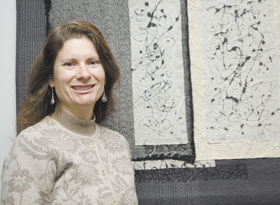  |
| HOME | THIS ISSUE | CALENDAR | GRANTS | BACK ISSUES | < BACK | NEXT > |
Federal grant to fund center for health communicationby Beth Krane - November 14, 2005
|
||||
|
A team of researchers led by communication sciences professor Leslie Snyder has won a $3.8 million federal grant to establish the Center for Health Communication and Health Marketing on the Storrs campus.
The new UConn center is one of the first two agencies in the country funded by the U.S. Centers for Disease Control and Prevention (CDC) to focus on health communication. “Until now, the only federally-funded centers to focus on health communication have been funded through the National Cancer Institute, and have focused exclusively on cancer-related communication campaigns,” says Snyder, who will be director of the new center. “This is a brand new opportunity in the field of health communication – an opportunity to focus on health communication more broadly.” The center, which will be housed within UConn’s Center for Health/HIV Intervention and Prevention (CHIP), is funded for three years. During that time, it will develop two communication tools – using what is known as “an educational entertainment approach” – to deliver messages about safe sex and the dangers of using club drugs to hard-to-reach teen and young adult audiences. The first project will be to create a video game that promotes safe sex for urban 18- to 25-year-olds from low socio-economic backgrounds, Snyder says. The researchers chose this age group, even though some teens become sexually active much younger, because research has shown that the older teens have the highest incidence of unprotected sex. The game, which will be designed by the research team in collaboration with a video game company, will target youth who are not in school and not likely to read newspapers or watch television news, and hence not likely to be exposed to health-related messages in other settings, she says. “We think the interactivity of the video game format will keep them engaged with the safe sex messages longer, and the opportunity for role playing will allow them to learn the appropriate negotiation skills,” Snyder says. “Video games have been used effectively for diabetes and asthma management, but not for safe sex. This is new.” Snyder says she expects to have a prototype of the video game ready for testing in Hartford, Willimantic, and Providence next fall, with the ultimate goal of distributing it for use in urban areas nationwide.
The center’s second project will be to develop and host a series of shows at local entertainment venues in Hartford that will appeal to urban youth ages 16 to 20, and include messages about the risks of club drug use, which may lead to other risky behaviors, Snyder says. The project will be a collaborative effort between UConn researchers and a new partner for the University – the Institute for Community Research in Hartford – that promotes local culture through community events and outreach. Jean Schensul, the organization’s founding director, is the lead investigator for the project with Snyder, who is co-principal investigator. The shows could include rap artists or salsa music and performers, for instance, and will strive to use well-known local entertainers, Snyder says. She also says some of the artists involved in the center-sponsored events might market the songs they develop for them. The center is aiming for a younger audience with its second project, because it hopes to reach teens before they start using club drugs, Snyder says. The goal is to hold the first show in Hartford next summer, and another in New Haven during the summer of 2007. Ultimately, the center plans to create a manual for producing successful events that other community organizations could use. “We’re hoping these shows become widespread practices,” Snyder says. “We want to reach people in a way they want to be reached.” In addition to the two projects to develop new communication tools, Snyder says the center will conduct research including analysis of existing health interventions and monitoring the advertising of healthy and unhealthy products. The team has already started analyzing the research literature on nutrition interventions. During its first three years, the center also will work with public health departments in all 50 states to analyze their health communication activities and identify programs they have designed that may be appropriate for duplication in other states or nationwide. The center will have two external advisory boards – one of research scientists and another of professionals in public health, communication, marketing, and health industries – as well as an internal executive committee. Researchers from the Health Center, several other UConn schools and departments, and the Connecticut Department of Public Health will be involved as center research affiliates. Jeffrey Fisher, a professor of social psychology and the director of CHIP, will be assistant director of the new center, which he considers a success story. A team of roughly 40 researchers already brought together as CHIP principal investigators and research affiliates, including Snyder, responded within three weeks to the CDC’s request for grant applications last May. “CHIP created the atmosphere where that could happen,” Fisher says. “We already had the interdisciplinary team assembled to respond quickly to the grant application and we are pleased to have this new center within CHIP.” |
| ADVANCE HOME UCONN HOME |

